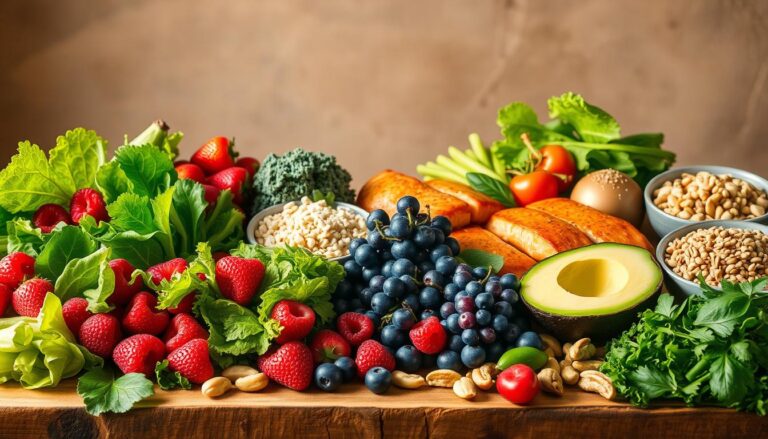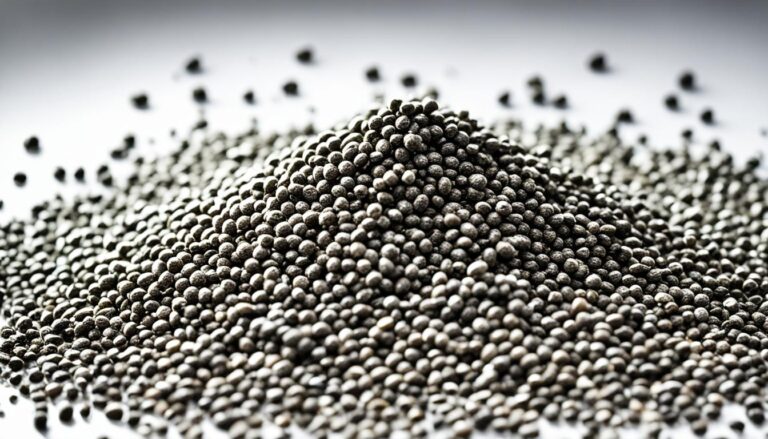We live in a world where the hustle and bustle of daily life takes its toll on our personal health. Taking care of our heart health is no longer more important than it once was.
Imagine those terrifying moments when you feel your heart racing due to stress exhaustion or even excitement.
These experiences serve as poignant reminders of our body’s delicate balance and the critical role our heart plays in our overall health. Embracing a heart-healthy diet not only nourishes your body but also brings peace of mind knowing that you’re taking proactive steps to safeguard your future.
This article aims to unveil the top ten heart-healthy foods that can help you cultivate a healthy heart supporting your cardiovascular wellness with every bite.
Key Takeaways
- Heart health is crucial for overall well-being and longevity.
- A balanced diet plays a significant role in preventing heart disease.
- Integrating heart healthy foods can significantly improve cardiovascular health.
- Understanding what constitutes a heart healthy diet helps in making informed choices.
- The article presents ten essential foods to enhance heart health.
The Importance of Heart Health
Maintaining heart health is essential for overall well being especially given the rising incidence of heart disease in the United States.
Understanding the factors contributing to this condition can help individuals take proactive measures towards healthier lifestyles. Heart disease encompasses various conditions affecting the heart’s functionality and may lead to serious complications if not addressed promptly.
Understanding Heart Disease
Heart disease is generally characterized by issues such as coronary artery disease, heart attacks and arrhythmias. Several elements may contribute to the development of heart disease including lifestyle choices genetics and pre-existing health conditions. Education about these factors is crucial as heart disease remains one of the leading causes of death in the country.
Statistics and Risk Factors
Heart health statistics underscore the gravity of the situation. Approximately one in three adults is living with heart disease revealing an urgent need for awareness and action.
Specifically over 103 million Americans are affected by high blood pressure one of the significant risk factors for heart disease. Understanding these risk factors such as obesity smoking and physical inactivity allows individuals to make informed decisions to safeguard their health.
| Heart Disease Statistics | Number of Americans Affected |
|---|---|
| Adults with Heart Disease | Approx. 88 million |
| Americans with High Blood Pressure | Over 103 million |
| Heart Disease-Related Deaths Annually | About 697,000 |
Key Benefits of a Heart Healthy Diet
A heart-healthy diet plays a vital role in maintaining optimal heart function and preventing various cardiovascular diseases. The choices one makes regarding food directly influence diet and heart health. Incorporating nutrient dense foods while reducing saturated fats leads to significant long term health advantages.
How Diet Affects Heart Health
Adopting a heart healthy eating pattern can drastically lower the risk of heart disease. Consuming foods rich in omega-3 fatty acids whole grains, and antioxidants supports healthy cholesterol levels and blood pressure. The benefits of a heart healthy diet include improved blood vessel function and reduced inflammation, creating a winning formula for cardiovascular wellness.
Long-Term Health Implications
Making sustained healthy dietary choices can foster better long term health outcomes. A balanced diet aids in weight management which directly correlates with lower risks of heart conditions.
Consistent intake of nutrient-rich foods aids in lowering cholesterol levels and overall mortality rates. The long-term benefits of a heart healthy diet resonate through various aspects of life enhancing overall quality and longevity.
10 Heart Healthy Foods
Embracing a diet filled with heart healthy foods can greatly influence your overall well-being. This section delves into various categories of food that promote heart health and can mitigate the risks associated with heart disease. Selecting a range of fruits, whole grains healthy fats and lean proteins can provide your heart with the fuel it needs to thrive.
Fruits and Vegetables Nature’s Medicine
Fruits and vegetables serve as vital components in any heart-healthy diet. They are packed with essential vitamins minerals and antioxidants that support heart function.
Incorporating a variety of heart healthy fruits such as berries oranges and leafy greens ensures sufficient intake of nutrients critical for cardiovascular health. Whole foods rich in fiber can help lower blood cholesterol levels making them a staple for anyone looking to enhance their heart health.
Whole Grains Fiber Rich Choices
Whole grains for heart health offer numerous benefits. Foods such as brown rice, quinoa, and whole-grain bread provide essential fiber, helping to lower cholesterol levels and regulate blood sugar. Regular consumption of these whole grains can bolster cardiovascular health while providing long-lasting energy throughout the day.
Healthy Fats Choosing the Right Oils
Incorporating healthy fats into your diet is crucial for heart health. Opt for oils such as olive oil and avocado oil which contain monounsaturated fats that can reduce bad cholesterol. These fats when chosen wisely play a significant role in promoting heart health and can improve overall heart function.
Lean Proteins Heart Smart Selections
Choosing lean proteins can aid in maintaining a healthy heart. Options such as skinless chicken fish legumes and tofu provide high-quality protein without the saturated fats found in many red meats. Incorporating these heart smart selections into your meals can support heart health while offering essential nutrients.
| Food Category | Examples | Health Benefits |
|---|---|---|
| Fruits | Berries Oranges Spinach | Rich in antioxidants and vitamins |
| Whole Grains | Brown Rice Quinoa Whole Wheat Bread | High in fiber lower cholesterol |
| Healthy Fats | Olive Oil Avocado Oil Nuts | Reduce bad cholesterol enhance heart function |
| Lean Proteins | Chicken Fish Legumes | Low in saturated fat high in nutrients |
Fruits and Vegetables to Prioritize
Choosing heart healthy fruits and nutrient dense vegetables plays a crucial role in supporting cardiovascular health. Incorporating these foods into your diet not only enhances overall nutrition but also provides specific benefits that target heart function and longevity.
Blueberries The Antioxidant Powerhouse
Blueberries stand out among antioxidant rich foods due to their high levels of flavonoids. These tiny berries help combat oxidative stress and inflammation both of which are linked to heart disease. Regular consumption of blueberries may lower blood pressure and improve arterial health, making them a top choice for those prioritizing heart health.
Spinach Nutrient Density in Greens
Spinach is packed with vitamins, minerals, and other nutrients making it a prime example of nutrient dense vegetables. This leafy green contains potassium folate, and antioxidants that can effectively reduce blood pressure and improve heart function. Adding spinach to your meals is an easy way to boost your heart health.
Broccoli Superfood for Your Heart
Broccoli reaches the forefront as a superfood due to its impressive nutrient profile. It offers high levels of fiber, vitamins C and K and important phytonutrients that contribute to cardiovascular wellness. Including broccoli in your diet can help maintain a healthy heart by offering benefits such as reduced cholesterol levels and improved circulation.

Whole Grains and Their Benefits
Incorporating whole grains into your daily diet offers significant advantages for heart health.
These nutrient packed foods not only provide essential vitamins and minerals but also play a crucial role in maintaining heart health by lowering cholesterol levels and improving digestion. Among the best whole grains quinoa oats and beans stand out for their heart healthy properties. Understanding their benefits can help you make informed dietary choices.
Quinoa A Protein Packed Grain
Quinoa is often hailed as a super grain due to its high protein content and amino acids. The whole grains benefits extend to quinoa making it an excellent choice for those looking to enhance their heart health.
Research suggests that quinoa can aid in reducing inflammation and improving cholesterol levels. Incorporating quinoa into salads bowls or as a side dish provides both nutrition and versatility in meals.
Oats Breakfast for Heart Health
Oats have long been recognized for their role in promoting heart health. The soluble fiber found in oats helps lower bad cholesterol levels improving overall cardiovascular health.
Consuming oats and heart health can go hand in hand especially when included as part of a balanced breakfast. Whether in a warm bowl of oatmeal or as a topping for yogurt oats are not only delicious but also beneficial for your heart.
Beans: Versatile and Nutritious
Beans are another fantastic source of whole grains that contribute to heart health. Packed with fiber protein and essential nutrients, beans can help maintain healthy blood pressure levels.
Their versatility allows for easy incorporation into a variety of dishes, from soups to salads. By embracing beans as a staple in your diet you reap the whole grains benefits making a positive impact on your overall health.
Healthy Sources of Protein
Including a variety of healthy protein sources in your diet is essential for maintaining optimal heart health. Among the best options, salmon and nuts provide distinct benefits. Incorporating these foods can help foster cardiovascular well-being and enhance overall nutrition.
Salmon: The Omega-3 Boost
Salmon stands out as one of the premier healthy protein sources. Rich in omega-3 fatty acids it contributes significantly to heart health. The salmon heart benefits arise from these fatty acids, which help reduce inflammation and lower cholesterol levels. Frequent consumption of salmon may decrease the risk of heart disease while offering a delicious way to enjoy your meals.
Nuts Guilt Free Snacking
Nuts serve as another excellent choice for heart health offering a variety of flavors and nutritional benefits. They are packed with healthy fats protein and essential vitamins.
Including nuts for heart health in your diet can enhance cardiovascular function and provide a satisfying snack option. Portion control remains crucial as nuts are calorically dense. A small handful each day can effectively boost your heart health without excess calories.

Read more: Portion Control for Weight Loss
Incorporating Healthy Fats
Healthy fats play an essential role in maintaining heart health. Incorporating these fats into your diet helps to lower bad cholesterol levels and improve overall cardiovascular function. Two standout sources of healthy fats are liquid plant oils and avocados, each offering unique benefits.
Liquid Plant Oils: A Smart Choice
Liquid plant oils such as olive oil and canola oil are rich in unsaturated fats. These healthy fats for heart health provide a healthier alternative to saturated fats found in butter and many animal products.
Cooking with liquid plant oils can significantly contribute to a heart-healthy diet as they support heart function and reduce inflammation. When selecting oils, look for cold-pressed or extra virgin varieties to maximize health benefits.
Avocados: Creamy and Nutritious
The benefits of avocados extend beyond their creamy texture and delicious taste. This fruit is packed with nutrients including potassium and fiber making it a versatile addition to meals.
Avocados are an excellent source of healthy fats that contribute to heart health. Regular inclusion of avocados in your diet can lead to improved cholesterol levels and lower the risk of heart disease.
The Role of Hydration in Heart Health
Maintaining proper hydration is essential for promoting heart health. Water is a crucial element in various bodily functions, including circulation and temperature regulation.
Adequate fluid intake supports the heart’s ability to pump blood effectively ensuring that nutrients and oxygen are delivered throughout the body. The water benefits extend beyond simple hydration they play a significant role in maintaining optimal cardiovascular function and overall health.
Water: The Essential Beverage
The human body comprises a significant percentage of water making it essential for survival and optimal functioning. Hydration and heart health are closely linked.
Drinking sufficient water helps to maintain blood volume regulate blood pressure and support heart function. Studies have shown that proper hydration can reduce the risk of heart disease. Incorporating water as the primary beverage can yield tremendous health benefits while combating fatigue and enhancing physical performance.
Limiting Sugary Drinks A Smart Move
While water serves as the healthiest beverage choice for heart health sugary drinks pose various risks. These beverages typically harbor high levels of added sugars which can lead to weight gain and increased risks of heart disease.
It is crucial to recognize the importance of limiting sugary drinks in a heart-healthy lifestyle. Focusing on water consumption can contribute positively to hydration levels and enhance heart health. Opting for healthier alternatives like sparkling water or herbal tea allows for flavorful choices without the excess sugars that compromise cardiovascular well-being.

Read more: 7 Drinks to Burn Belly Fat
| Drink Type | Calories per Serving | Sugar Content grams | Hydration Benefits |
|---|---|---|---|
| Water | 0 | 0 | Excellent |
| Soda | 150 | 39 | Poor |
| Fruit Juice | 110 | 22 | Moderate |
| Sweetened Tea | 120 | 30 | Poor |
| Sports Drink | 80 | 21 | Poor |
Conclusion
In this heart healthy foods summary we’ve explored the critical connection between diet and cardiovascular well-being.
By prioritizing fruits vegetables whole grains healthy fats and lean proteins individuals can significantly improve their heart health. The importance of diet for heart health cannot be overstated making smart dietary choices not only lowers the risk of heart disease but contributes to overall wellness.
The key takeaways emphasize that incorporating nutrient-dense foods like blueberries, quinoa, and avocados into daily meals is essential for long-term health benefits. Remember a mindful approach to nutrition lays the foundation for a stronger heart and better quality of life. Small changes in eating habits can lead to profound effects on heart health.
By staying informed and making conscious decisions to include these heart-healthy options, anyone can take charge of their cardiovascular health. Embracing these heart health takeaways is a powerful step towards a healthier future, ensuring you and your loved ones enjoy the benefits of a balanced diet.





